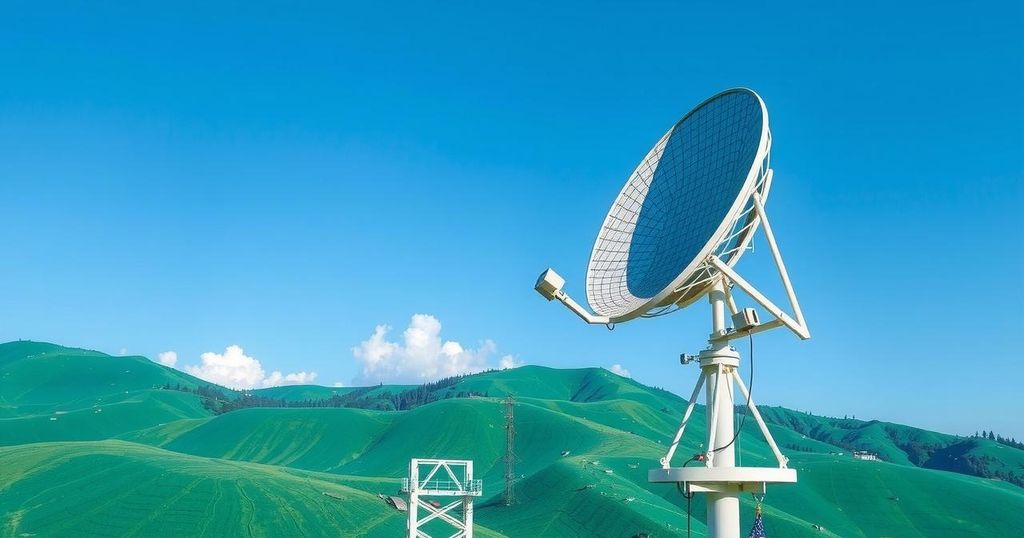Elon Musk Targets Lebanon for Starlink Expansion, Boosting Telecom Growth

- Elon Musk aims to expand Starlink internet service to Lebanon.
- Lebanese President Joseph Aoun has welcomed Musk’s interest.
- Marc Beyrouthy emphasizes the urgency for infrastructure improvements.
- Concerns about cyber surveillance accompany excitement for Starlink.
- Economic adviser Roy Badaro warns against media exaggerations.
- Starlink could provide crucial support for Lebanon’s internet reliability.
Elon Musk Eyes Lebanon for Starlink Initiative
Elon Musk has set his sights on Lebanon as the next location for Starlink’s satellite internet expansion, spurred by recent discussions with Lebanese President Joseph Aoun and his team. Earlier in Beirut, President Aoun met with Sam Turner, who is the Global Director of Licensing and Development for Starlink, to explore the possibilities of satellite internet services for the nation. U.S. Ambassador Lisa Johnson was also involved in these important dialogues that unfolded, shedding light on the future of Lebanon’s internet connectivity.
Lebanese Officials Welcome Starlink’s Interest
The official statements shared via the Lebanese Presidency’s Twitter account reveal Musk’s interest in Lebanon’s telecommunications sector. As the CEO of Tesla, SpaceX, and the platform formerly known as Twitter, Musk expressed his eagerness to see his companies make inroads into the Lebanese market, something President Aoun enthusiastically supported. “We will ensure that all possible facilitation will be provided within the framework of Lebanese laws and regulations,” Aoun pledged to Musk, showcasing an eagerness to welcome the proposed collaboration.
Need for Infrastructure Upgrades is Critical
This spotlight on Lebanon’s telecommunications industry underscores an urgent need for upgrading infrastructure to boost economic growth, a sentiment echoed by Marc Beyrouthy, a key figure in social innovation and entrepreneurship within Lebanon. Beyrouthy emphasizes how crucial reliable internet is for businesses, as delays and frustrations stemming from poor internet access can hinder productivity significantly. The country’s current fixed-line network is still heavily reliant on outdated infrastructure, with fiber-optic availability restricted mainly to urban areas. Furthermore, many rural communities suffer from painfully slow internet, with speeds often lagging below 50 Mbps; this is a considerable barrier to business growth and innovation in the country. Beyrouthy remarked, “90% of enterprises have to lease microwave lines from the private sector, and the country has virtually no redundancy to the global internet, making it a major challenge for growth.”
Mixed Reactions from Local Entrepreneurs
Nevertheless, the entrance of Starlink into Lebanon has generated a concoction of optimism and caution among local entrepreneurs. A young entrepreneur traveling frequently across Europe shared mixed thoughts on Starlink’s potential impact, suggesting that while it could significantly uplift Lebanon’s tech sector, there are undeniable risks. Although Starlink’s services could improve access, especially in under-served areas, concerns loom regarding potential cyber surveillance. “Musk’s connections to the U.S. and Israel spark apprehension about data security and monitoring. Our data could be surveilled, making Starlink a double-edged sword,” they expressed. This level of apprehension, paired with worries over the implications of allowing private companies to have control over vital infrastructure, leads to fears of political influence, citing Ukraine’s recent experiences with Starlink during the war as a cautionary example. They stated, “The issue with introducing private infrastructure is that it opens doors to potential external pressures from political entities.”
Media Exaggeration of Musk’s Interest
Amid all of this, concerns also arise from the media portrayal of Musk’s statements about the partnership opportunities in Lebanon. Roy Badaro, an economic adviser in Lebanon, noted that there has been a tendency for some media reports to exaggerate Musk’s statements. “The prospect here is primarily about enhancing internet connectivity through Starlink, which may later be extended to Syria,” Badaro noted. His perspective illustrates the wisdom of maintaining realistic expectations about the rollout of these proposed services. The reliability of the connection that Starlink promises could indeed provide a backup for scenarios where local infrastructure fails momentarily—such as during crises—therefore, Badaro’s pragmatic outlook mirrors a larger communal sentiment.
Geopolitical Context Influences Starlink’s Offer
The geopolitical landscape in which Lebanon finds itself cannot be overlooked, particularly as Musk’s offer comes when the region experiences heightened tensions. Calcalist reported that the Israeli government is eyeing Musk’s Starlink services for ensuring communication continuity in the face of potential conflicts, especially with threats from Hezbollah. Such scenarios show a rising strategic inclination towards satellite communications, highlighting Starlink’s critical role in crisis situations. As Lebanon is in a crucial period of potential digital transformation, it finds itself at the intersection of technological possibilities and political realities, continually attempting to maintain a balance between local interests and international investments.
As discussions of Elon Musk’s interest in establishing Starlink’s satellite internet services in Lebanon unfold, a mixed response emerges among local stakeholders. While the promise of improved internet connectivity could aid in addressing the country’s urgent technological needs, concerns about data security, political influence, and media exaggeration remain prevalent. The outcome of this potential collaboration will not only impact Lebanon’s internet landscape but could also define the nation’s economic growth and technological evolution in a rapidly changing digital age.




